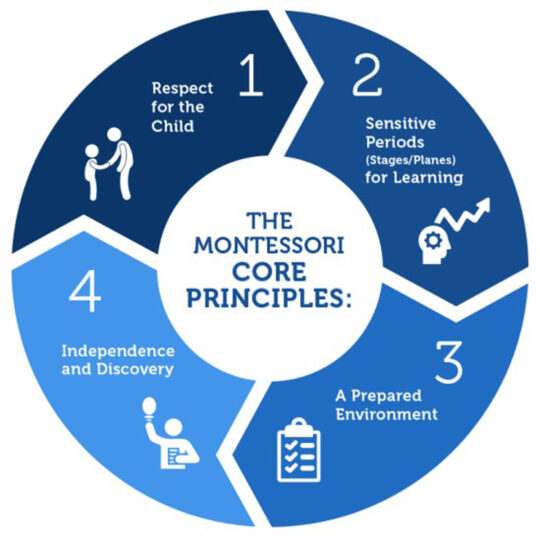
Maria Montessori
Maria Montessori: Dr. Montessori believed that every educator should “follow the child”, recognizing the evolutionary needs and characteristics of each age, and building a favorable environment, both physical and spiritual, to respond to these needs. Children’s development emerges as a need to adapt to his/her environment: the child needs to give a meaning to the world that surrounds him/her, and he/she constructs him/herself in relation to this world.
Maria Montessori observed that the child goes from infancy to adulthood through 4 evolutionary periods called “Planes of Development”. Each period presents characteristics that are radically different from the other periods, but each of them constitutes the foundation of the following period. In her book, The Absorbent Mind, Montessori explained that: “In the same way, the caterpillar and the butterfly are two creatures very different to look at and in the way they behave, yet the beauty of the butterfly comes from its life in the larval form, and not through any efforts it may make to imitate another butterfly. We serve the future by protecting the present. The more fully the needs of one period are met, the greater will be the success of the next.”
Friedrich Froebel
A German educator who invented the kindergarten. He believed that ‘play is the highest expression of human development in childhood for it alone is the free expression of what is in the child’s soul.’ Froebel believed that in play children create their understanding of the world through directly engaging with it. His ideas about learning through nature and the importance of play are now popular throughout the world.
Froebel considered the whole – The childs’ health, physical development, the environment, emotional well-being, mental ability, social relationships and spiritual aspects of development as equally important.
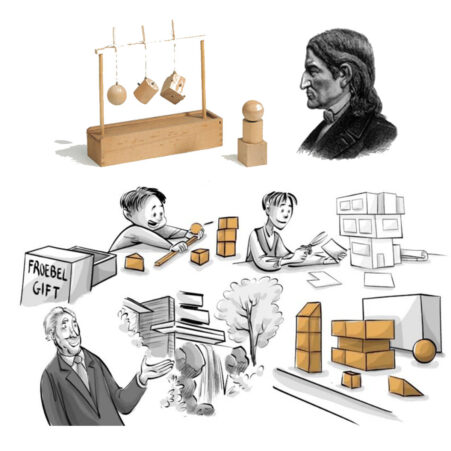
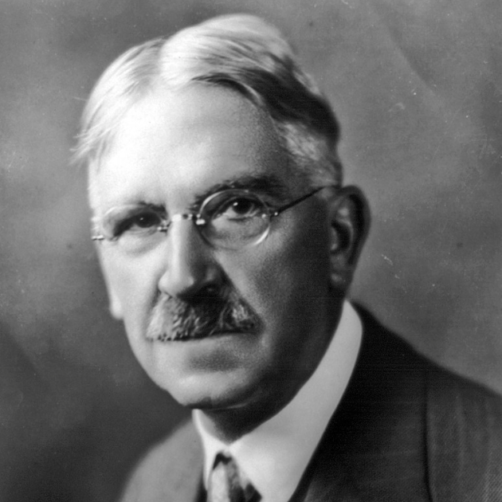
John Dewey
John Dewey believed that learning was socially constructed, and that brain-based pedagogy should place children, rather than curriculum, at its centre. Effective learning requires students to use previous (and prevailing) experiences to create new meaning. He is largely known for his emphasis on experiential learning, social learning, and a basic Constructivist approach to pedagogy and the idea of self-knowledge, inquiry-based learning, and even self-directed learning. He visualized that in learner-centred classrooms, children be viewed as unique individuals and should be found busy at work constructing their own knowledge through hands-on approaches and personal meaning, rather than teacher-imposed knowledge and teacher-directed. When teachers plan for instruction, student interests will be taken into consideration and curricular subjects will be integrated with an emphasis on project learning. The educational experience encompasses the intellectual, social, emotional, physical, and spiritual growth of the whole child, not just academic growth.
Rabindranath Tagore
Tagore’s system of education emphasises the moral, intellectual, social, physical, spiritual and economic aspects to develop an integrated personality. He laid importance of freedom in education. He rejected any form of narrowness that separated human being from human being. He saw education as a vehicle for appreciating the richest aspects of other cultures, while maintaining one’s own cultural specificity. He believed in the importance of the arts for developing empathy and sensitivity; and the requirement for a harmonious relationship with one’s cultural and with nature. Tagore believed that a curriculum should revolve around nature. Tagore celebrated the one-ness of the world and diversity. He believed that children are not ‘unfinished adults’ but have to be seen in their own rights; so they can develop their curiosity and wonder, their imagination and creative joy and their ability to see unity that derives from their freedom from habits of thought and behaviour. He believed children require indefiniteness and learn mostly unconsciously.
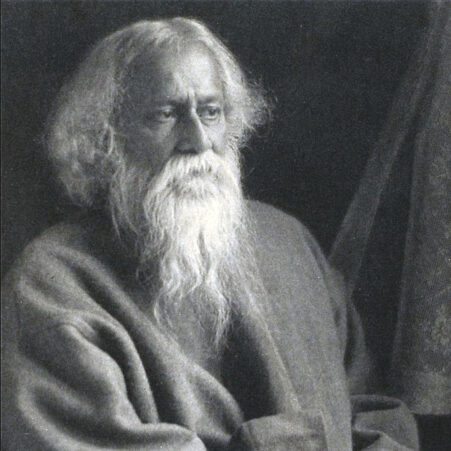
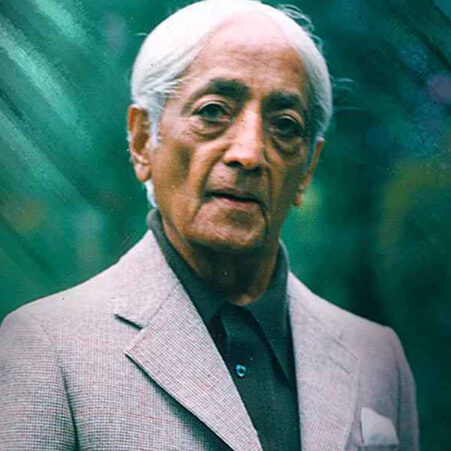
Jiddu Krishnamurti
Krishnamurti spent his entire life regarding education as being the agent of social change. He believed that one individual’s action affects another and that there is no individual consciousness but only a collective human consciousness. Thus the world is not separate from the individual. Krishnamurti asserted that psychological development of individuals is as important as acquiring academic knowledge and skills. It is important that education should in fact ‘awaken intelligence’ and not simply reproduce a programmed machine or trained monkey, as Krishnamurti put it. Education therefore cannot be only about reading and learning from books but about the whole of life, and should prepare students to meet the challenges of living in a complex social world.

Maria Montessori
Maria Montessori: Dr. Montessori believed that every educator should “follow the child”, recognizing the evolutionary needs and characteristics of each age, and building a favorable environment, both physical and spiritual, to respond to these needs. Children’s development emerges as a need to adapt to his/her environment: the child needs to give a meaning to the world that surrounds him/her, and he/she constructs him/herself in relation to this world.
Maria Montessori observed that the child goes from infancy to adulthood through 4 evolutionary periods called “Planes of Development”. Each period presents characteristics that are radically different from the other periods, but each of them constitutes the foundation of the following period. In her book, The Absorbent Mind, Montessori explained that: “In the same way, the caterpillar and the butterfly are two creatures very different to look at and in the way they behave, yet the beauty of the butterfly comes from its life in the larval form, and not through any efforts it may make to imitate another butterfly. We serve the future by protecting the present. The more fully the needs of one period are met, the greater will be the success of the next.”

Friedrich Froebel
A German educator who invented the kindergarten. He believed that ‘play is the highest expression of human development in childhood for it alone is the free expression of what is in the child’s soul.’ Froebel believed that in play children create their understanding of the world through directly engaging with it. His ideas about learning through nature and the importance of play are now popular throughout the world.
Froebel considered the whole – The childs’ health, physical development, the environment, emotional well-being, mental ability, social relationships and spiritual aspects of development as equally important.

Benjamin Bloom
John Dewey believed that learning was socially constructed, and that brain-based pedagogy should place children, rather than curriculum, at its centre. Effective learning requires students to use previous (and prevailing) experiences to create new meaning. He is largely known for his emphasis on experiential learning, social learning, and a basic Constructivist approach to pedagogy and the idea of self-knowledge, inquiry-based learning, and even self-directed learning. He visualized that in learner-centred classrooms, children be viewed as unique individuals and should be found busy at work constructing their own knowledge through hands-on approaches and personal meaning, rather than teacher-imposed knowledge and teacher-directed. When teachers plan for instruction, student interests will be taken into consideration and curricular subjects will be integrated with an emphasis on project learning. The educational experience encompasses the intellectual, social, emotional, physical, and spiritual growth of the whole child, not just academic growth.

Rabindranath Tagore
Tagore’s system of education emphasises the moral, intellectual, social, physical, spiritual and economic aspects to develop an integrated personality. He laid importance of freedom in education. He rejected any form of narrowness that separated human being from human being. He saw education as a vehicle for appreciating the richest aspects of other cultures, while maintaining one’s own cultural specificity. He believed in the importance of the arts for developing empathy and sensitivity; and the requirement for a harmonious relationship with one’s cultural and with nature. Tagore believed that a curriculum should revolve around nature. Tagore celebrated the one-ness of the world and diversity. He believed that children are not ‘unfinished adults’ but have to be seen in their own rights; so they can develop their curiosity and wonder, their imagination and creative joy and their ability to see unity that derives from their freedom from habits of thought and behaviour. He believed children require indefiniteness and learn mostly unconsciously.

Jiddu Krishnamurti
Krishnamurti spent his entire life regarding education as being the agent of social change. He believed that one individual’s action affects another and that there is no individual consciousness but only a collective human consciousness. Thus the world is not separate from the individual. Krishnamurti asserted that psychological development of individuals is as important as acquiring academic knowledge and skills. It is important that education should in fact ‘awaken intelligence’ and not simply reproduce a programmed machine or trained monkey, as Krishnamurti put it. Education therefore cannot be only about reading and learning from books but about the whole of life, and should prepare students to meet the challenges of living in a complex social world.


